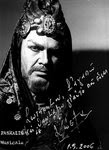 Listen to Natalie Dessay singing "Quando rapito in estasi"
Listen to Natalie Dessay singing "Quando rapito in estasi"in San Francisco, June 2008
|
Natalie speaks about Lucia:
Lucia is a difficult role, Dessay says. It's much more serious than Marie. It has to be deeper in feelings and in the acting. I'm very physical, so for me (conveying intense emotions is) very difficult. I'm an expressionist singer, and this is an impressionist role.
 The glorious Act 2 Sextet
The glorious Act 2 Sextet
|
And a review on the San Francisco Lucia:
On the one hand there was Dessay, giving a precise, luminous and impeccably controlled performance that portrayed Lucia as a spirited but moody girl undone by love. On the other were two Italian singers of the old school, tenor Giuseppe Filianoti as Lucia's ill-fated lover, Edgardo, and baritone Gabriele Viviani as her brother Enrico.
To judge from Tuesday's debuts, these are both singers with a vivid, red-blooded approach to opera - always on the edge emotionally, and never happier than when unleashing a furious fortissimo or making a headstrong push against conductor Jean-Yves Ossonce's rhythmic pulse.
Both performances made for gripping theater, and both men sang with plenty of tonal assurance and stylistic flair. But it wasn't hard to understand why Lucia might have longed for a little respite.
That respite came in the famous Mad Scene, in which Dessay turned what is usually an extravaganza into a concentrated burst of subdued anguish. Roaming through the world of her untethered imagination - and accompanied by the eerie sounds of the glass harmonica, as Donizetti originally intended - she seemed to be communicating from some distant, uncharted realm; the explosion of unmotivated laughter at the scene's end made it all the more riveting.
But even before that climactic tour de force, Dessay had already established the musical prowess and theatrical versatility of her performance. Her Act 1 aria, "Regnava nel silenzio," was marked by luscious, inviting legato phrases and crowned by nimble, precise coloratura in the concluding cabaletta, "Quando rapito in estasi."
Even more arresting was her dramatic showdown with Enrico, as he dragoons her into the forced marriage that will save his political and economic fortunes at the expense of her own happiness. Dessay conveyed the depth of Lucia's plight in fluid but agonized phrases and lively musical interaction with Viviani.
 Act 2 Finale
Act 2 Finale
|

Mad Scene finale
|

And the ab-fab Intermezzo reports:
Just a quickie from the openimg night of Lucia di Lammermoor at the San Francisco Opera, where after a wobbly start Natalie Dessay stormed through the title role, every note in place, with exquisite poise and total control. If she (surprisingly) wasn't 100% convincing dramatically, that was down to the production, curiously static, rather undirected, set entirely on a heather carpeted 'Scottish moor' that looked more like the rough end of a car park. Jean-Yves Ossonce's sluggish pacing hardly helped. Giuseppe Filianoti as Edgardo pushed like he was about to lay an egg, sounding severely strained and compressed rather too often, but his tail-wagging enthusiasm lifted the production every time he came on stage.
An entertaining evening, but with nothing else up to La Nata's standard, it made me appreciate just how good David Alden's much less starry recent production at the ENO really was. Full report and pictures later.
Spargi d' amaro pianto
|
Enjoy!
If inaudible, use Internet Explorer



















.jpg)





















4 comments:
Thank you Parsifalito for this treasure, I found her to be in excellent voice and very involved in the action, but not so much as to ruin the bel canto. But where is the laughter at the end of the Mad Scene, I heard nothing....
And, even though she is french, I found this to be far superior to the french version she recorded together with Alagna. That was a recording I didn't like, perhaps I am not aquainted to it. What do you think of the french "original" and do you prefer - as I do - Patricia Ciofi's verson, even though she is italian?
Dessay is one of the most complete artists of her generation. Ruin belcanto? Hell no! She might breathe life to belcanto, but ruin not. I also think she 's in good voice, but i wouldnt compare her current abilities to those before the operations (back, lets say, in 1999). Still she s a great singer (ok, sorry Natalie, a great singing actress).
I like Patrizia Ciofi's version a lot. I totally adore Ciofi's artistry, and even if people used to find her scary on stage (due to the veins of the neck usually) i always thought she looked so fragile and so involved to whatever she was singing. I would love to see her live at La Scala this year, singing in the Viaggio A Reims next to Remigio and Massis....
Charlie Rose recently interviewed Natalie Dessay which you would probably like to listen to, it's really great because she explains how she views opera and theater and how she approaches her roles:
http://www.charlierose.com/shows/2007/10/09/2/a-conversation-with-natalie-dessay
I believe there is an interview first with someone else, but the second part is all Dessay and it is pretty extensive.
I was there, but not the same night as you, I am sure. The night I attended (the 26th, I think) was very uneven, even Dessay. The first act was sluggish and she didn't pick up until the scene with Enrico. The conducting was the worst I've heard anywhere, which I cannot fault the SFO orchestra since I have been going to SFO for many years. Filanotti was good, but way, way too strained with the high notes.
Dessay's mad scene was exquisite that night.
Do you have the whole opera? If so, can you post it?
Thanks,
WM
Post a Comment